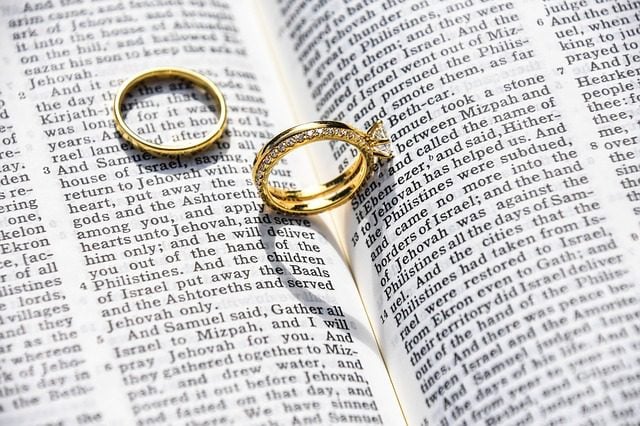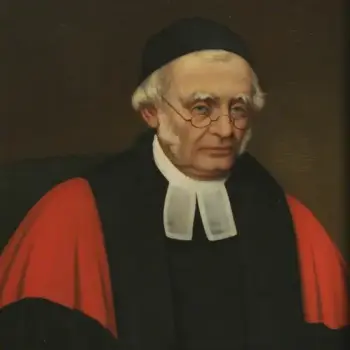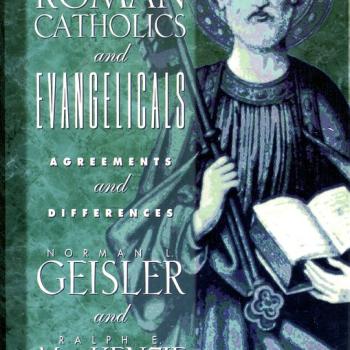
It’s very difficult to be in this situation, because both sides have heartfelt beliefs and feel that they can’t compromise.
The party in a formerly all-Protestant marriage who feels led to Catholicism can always attend Mass on Saturdays and continue to worship with the Protestant spouse at his or her service. The Protestant may feel duty-bound to not worship at Mass, but I don’t see why a Catholic could not go to a Protestant worship service (as long as they don’t imply belief in things contrary to Catholicism, and don’t partake in communion, etc.).
There is nothing contradictory at all in doing so, as long as one doesn’t go against anything one has come to believe. I would strongly urge all in this situation to do this, as a way to avoid a painful rupture in worship practices. And perhaps one day the Protestant party will be willing to attend Mass. They don’t have to kneel. They don’t have to violate anything they believe. It’s a gesture of unity.
It takes two to bend in these situations. In my opinion, it is unwise and pretty inflexible for the potential or actual Catholic to refuse to go to Mass on Saturday in order to maintain some sense of continuity of the former worship practice in the marriage, and for the sake of the feelings of the Protestant party (if the latter has expressed a strong need to keep worshiping together). It certainly seems like one good avenue to seriously consider.
I always urge Catholic converts to be as respectful and considerate of the feelings and opinions of their Protestant spouses as they can be. There are many ways to do that, that are often overlooked or spurned. I think it is supremely important to emphasize common ground. There is so much: virtually the entire Nicene Creed, etc.
I am on record, time and again, recommending that newly converted Catholics not push Catholic belief on spouses (i.e., not in an overly zealous, forceful, obnoxious, contentious way). It’s a matter of conscience for everyone and each person has to believe and worship according to their own conscience, under God. Allowing a person to follow their convictions and conscience seems to be the bare minimum and not really arguable (except some situations where children are involved, which makes it all get much more complex).
If constructive conversation on these matters is to be had, it can’t be forced, and timing and sensitivity are everything. Yes, we should share our faith, but with wisdom, discretion, and prudence: above all in family situations and with others who are close to us and/or with us a lot of the time.
Likewise, I would say that Protestants ought to grant those who feel led to Catholicism that right and prerogative, without all this pressure put upon them, as if the potential future Catholic has two heads or a screw loose. But of course if Catholics are not regarded as fellow Christians, just like any other fellow Protestant group, then extreme difficulty arises, because one person is trying to save the other from hell and the Great Whore of Babylon, etc.
This is why I have challenged, time and again, the more vocal Internet debaters for the anti-Catholic position, to engage the topic of the definition of Christianity in a live chat room setting. But they persistently refuse. There could be so much less conflict and pain if both sides would just talk intelligently about such fundamental issues.
Some who are going through this crisis may feel that God doesn’t care about spiritual unity in the family. That is not the case at all, and we can’t jump from our own situations, brought about by various causes and shortcomings, and what God wills. He wants profound unity not only in marriages but in the Body of Christ (John 17 and many Pauline passages). That is an objective truth.
Identifying the sum of doctrinal propositions of such unity is, of course, the difficulty, because folks disagree on such content. But can’t we all agree that there is such a thing as “Christian truth” and “biblical truth”; that it is not relative to the person or group, and that there must be some objective way to discern it?
The one thing no one can say, it seems to me (Protestant or Catholic or Orthodox or “non-denominational” storefront church in Podunk) is that God has no opinion on spiritual unity and that there is no one truth to be discovered.
Protestants traditionally (but well past the “Reformation” period) have dealt with this conundrum by the notion of primary and secondary doctrines, with the latter being the dozens of doctrines and practices where they disagree and have found no way to determine the one true doctrine.
Catholics continue to argue in may ways that the Catholic Church is the fullness of Christian truth, embodied in the historical institution of the Church, led by the Holy Spirit and protected from doctrinal error.
In a marriage situation, there are great practical difficulties, and the issue of respecting the right of conscience of our spouse to worship as they feel that they should (just as law and society do, or should) has to be squarely faced. There are only so many choices as to how to go about coping with the stress of such a difficult and stressful situation:
1) If the two are able to disagree amiably and have discussions where there are disagreements without degenerating into squabbles and quarrels, then they can calmly discuss theological differences, with mutual respect and the emphasis on trying to better understand the other’s point of view (if not yet being persuaded by it). This would be the ideal.
2) If the two, however, have a history of not being able to disagree amiably, without hurtful insults and tempers being lost (including, presumably, on theological matters in particular), then they may decide to mutually agree to allow each other to believe and worship as they please, and agree to disagree (basically, avoid the subject for the sake of peace, and to be mutually tolerant by default, so to speak).
3) A third way to go about it (if #2 is generally the case) is to discuss theological matters in either a group setting (from either theological party) or a moderated setting. Both of these scenarios minimize the possibility of someone losing it and flying off the handle, and maximize (assuming the sensibility of groups and moderators) the potential of constructive discourse and increase of understanding.
4) A fourth option is the acceptance of #2: not wanting to talk and quarrel, but both being willing to read on their own, materials recommended by the spouse. This is both non-confrontational and educational, and ultimately makes for peace of some sort, or at least “peaceful coexistence,” in a sort of detente.
Then when both feel that they can talk sensibly, and after passions have died down, they can attempt the ideal solution of #1, and talk about the issues, with more knowledge about what they are, and how the discussion can constructively proceed, to mutual advantage.
In any event, it is not due to the nature of either faith community that difficulty in discussing the issues is present. It is erroneous to extrapolate to God that somehow He doesn’t want unity because these situations arise. That doesn’t follow.
I can understand the emotions of the situation, but emotionalism is not the way to progress to the peace and harmony that married couples obviously desire. It has to be resolved by objective means. They may continue to theologically disagree, but I don’t see why that means never-ending tension and strife. That doesn’t necessarily follow at all. Certainly it is possible for folks to have an amiable conversation about theological differences, even when married!
So I think the primary factor in cases of tension over theology is likely the dynamic of the relationship and the two personalities, which is not theological in origin, at bottom. It’s clearly more personal than theological, on the level of underlying cause.
The unity I was referring to in my recommendation of each spouse attending worship with the other presupposed that worshiping together was very important to them. It isn’t theological unity so much as it is marital unity and consideration of the other.
In the midst of personal, emotional agony (as opposed to merely abstract theological difference), there are ways to still worship together. Everyone knows such a couple doesn’t agree on everything. That isn’t the point. I’m not advocating warm fuzzy pseudo-ecumenism. I despise that. But it is two Christians worshiping together insofar as they are able.
Most “mixed” couples will have to avoid the usual “hot issues” for the time being. But they can discuss things like the incarnation, the Holy Trinity, the divinity of Jesus, the Resurrection, salvation by grace alone, heaven and hell, angels, the inspiration of the Bible (setting aside the deuterocanon for the moment), baptism, many moral teachings held in common.
There is a world of things that can be discussed in unity. Couples just have avoid the ones where they clash. Most married couples have those areas that they avoid for the sake of peace, whether it has to do with various areas of finance or childrearing, or frequency of intimacy and various sensitivities in that regard, and so forth. Why should theology be any different?
But these are personal, personality, marital issues, of how to talk about these subjects, not solely theological and ecclesiological. Nothing in Catholicism per se requires that there must be marital friction simply because one person became a Catholic. People can talk and try to understand and respect each other.
A Protestant-Catholic marriage has tensions more so because it is a difference, period, not so much because it is specifically a theological difference. And the way this rather painful, agonizing difference can be worked out is like any other difference in marriage: by compromise, a lot of listening, and both parties being willing to bend and give in, in areas where they are allowed to do so, without violating conscience and firmly held belief.
I disagree strongly that it is the nature of Catholicism to make married couples miserable because one is Protestant. There will naturally be an unavoidable strain, from differences, but that goes back to why married couples have a hard time with any number of differences and disagreements.
Most couples in this difficult situation love each other and want to be happily married; it is completely possible that they can willingly avoid certain things (not necessarily forever) for the sake of the marriage and the spouse that they dearly love. This is not the worst possible thing by a long shot. Imagine if a spouse had become an atheist or a Muslim!? Talk about marital friction! Protestants and Catholics are both Christian.
It’s right to feel the pain of separation on both sides (I’m the only Catholic in my entire extended family), but for heaven’s sake, why can’t we rejoice in what we hold in common, too? There is nothing whatsoever wrong about that. It’s not head-in-the-sand or pie-in-the-sky: it’s acknowledging a reality where two people have strong differences, but where they also have a great deal in common too, as Christians.
When there is tension it is only sensible and smart to emphasize the commonalities. Once things calm down, then couples can try to do the “heavy” conversations (if they are able to disagree amiably with each other).
No one can force anyone else to believe a certain thing. They are free as an individual before God to make that choice on their own. That said, I would say that both parties should respect their spouse’s feelings and do all they can to maintain existing common ground in these matters, including worshiping together. If it means a long drive to an alternate Saturday Mass to do so, so that they can worship together in a Protestant service on Sunday, both should be willing to do it in a heartbeat.
That’s acting in a sensitive, loving fashion, insofar as both can do so in good conscience. The Catholic violates nothing in Catholicism, in doing that. Many people drive a long way to work every day. One day a week wouldn’t or shouldn’t put anyone out.
Some might say that those in this situation should compromise and reach a mutually agreeable solution. But how does this work in religious matters? Think about it for a moment. How does one compromise in matters of conscience? This is a huge can of worms.
If one spouse thinks and believes in faith one set of doctrines is truth and the other subscribes to another, with equally heartfelt faith and sincerity, though they (Catholic and Protestant) actually intersect about 60-70%, the other areas where they differ do not allow either party to ignore what they themselves believe.
So how does one “compromise” in such a situation? There is no feasible, workable “compromise” in this sense. Neither party can simply change what they believe, apart from the usual means of persuasion and God changing folks’ hearts. The only way to “compromise” is to do exactly what I have suggested: go easy, avoid hot topics, stress common ground, and worship together insofar as it is possible to do so.
When the Catholic spouse is at the Protestant service, at least he or she is in a place with the Protestant spouse where the latter fully accepts the creed or statement of belief (and much of it a Catholic can agree with). If the Protestant spouse goes to Mass, then he or she is in a place where at least their spouse fully accepts the belief-system. At least one party is accepting the beliefs of the surroundings. This is what people do when they have differing beliefs that don’t allow compromise, by their nature.
So how in the world would “compromises” like the above scenarios work? I can’t imagine any “solution” that would be anywhere near satisfactory. But we can tolerate differences that we have with each other. It’s a lot harder (and, I think, more praiseworthy) to get along while having profound differences, than to minimize these and adopt some “compromise” that is pleasing and satisfactory to no one and compromises both people. That is true tolerance and Christian charity.
(originally 5-7-08; revised on 4-25-18)
Photo credit: Photograph by StockSnap (August 2017) [Pixabay / CC0 Creative Commons license]
***













